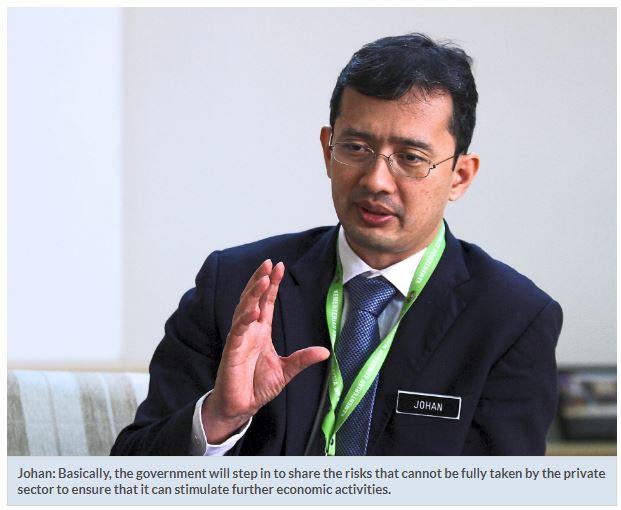Malaysia: Govt to share business risk
PUTRAJAYA: Risk-sharing between the government and the private sector is one of the key elements of Budget 2020 that aspires to create more business opportunities for Malaysians, according to National Budget Office director Johan Mahmood Merican.
In an exclusive interview with StarBiz, Johan described Budget 2020 as “growth-centric and in the spirit of an entrepreneurial state”.
In view of the heightened global uncertainties and the country’s moderating economic growth, Johan said that the government seeks to stimulate more private investments and business activities by sharing certain risks borne by the private sector through its Budget 2020 measures.
One such example is the enhanced Skim Jaminan Pinjaman Perniagaan (SJPP), which aims to strengthen access to financing for Malaysian small and medium enterprises (SMEs).
Under Budget 2020, the government guarantee for financing secured by bumiputra SMEs, export-oriented SMEs and SMEs investing in automation and digitalisation will be increased from 70% to 80%.
Finance Minister Lim Guan Eng also said during the tabling of Budget 2020 that a new SJPP allocation of RM500mil in guarantee facility will be launched, earmarked for women entrepreneurs.
“With the SJPP guarantee limit increased from 70% to 80%, this will leave the banks with smaller residual risks. Hopefully, the banks will then feel encouraged to support SMEs by providing more financing.
“Another example is the RM10bil rent-to-own (RTO) financing scheme, where the government will come in with a 30% or RM3bil guarantee to help Malaysians gain access to financing to purchase their homes.
“Basically, the government will step in to share the risks that cannot be fully taken by the private sector to ensure that it can stimulate further economsic activities, ” said Johan.
Under the RTO scheme, which is for the purchase of first homes priced up to RM500,000, the applicant will rent the property for up to five years.
After the first year, the tenant will have the option of purchasing the house based on the price fixed at the time the tenancy agreement is signed.
Johan expressed his hope that the private sector will respond positively to the government’s measures under Budget 2020 aimed at generating greater private investments.
The government expects the country’s private investments to grow by 2.1% in 2020, up from the forecast 1.5% this year. For context, Malaysia’s private investments expanded by 9% in 2017 but declined to 4.3% in 2018.
On the government’s decision to set a minimum wage of RM1,200 only for major cities, Johan said this was done to avoid “overly burdening the businesses”.
“The government needs to think carefully about balancing the needs of the workers and the needs of employers, particularly given the global economic environment.
“We took cognisance of the fact that the cost of living is higher in urban areas. The other factor that was considered is that we don’t want to disadvantage or discourage companies from setting up operations in non-urban areas to take advantage of the lower cost of labour. “Moving forward, adjustments to the minimum wage will depend on the current conditions, ” he said.
Meanwhile, when asked to comment on why there were no clear strategies under Budget 2020 to stimulate the country’s stock exchange, Johan said “the focus is on the real economy rather than the stock market”.
“We are focusing on stimulating economic growth and investments in the real economy, with the hope that growth in the real economy will then spill over to the capital markets, ” he said.
For perspective, the FBM KLCI – the benchmark indicator of the Malaysian stock exchange – has declined by about 16.9% since its record high level in April 2018.
Johan said that Budget 2020 is expansionary in nature and tailored to pre-empt challenges caused by the global economic slowdown.
“The government sees fit to raise the deficit level to 3.2% to allow for higher expenditure, so that the country’s growth momentum can be maintained amid global challenges.
“Nevertheless, the government remains committed to its fiscal consolidation target while providing adequate fiscal measures to stimulate the economy, ” he said.
The government had previously forecast achieving a fiscal deficit target of gross domestic product of 3% in 2020, down from 3.4% this year.
However, in Budget 2020, the estimate for 2020 was revised higher to 3.2% to account for higher expenditure.
The government has allocated RM241bil and RM56bil for operating and development expenditures, respectively, under Budget 2020.
Source: https://www.thestar.com.my/business/business-news/2019/10/17/govt-to-share-business-risk#4FpoA4I1aoQQ8d4U.99


 English
English




